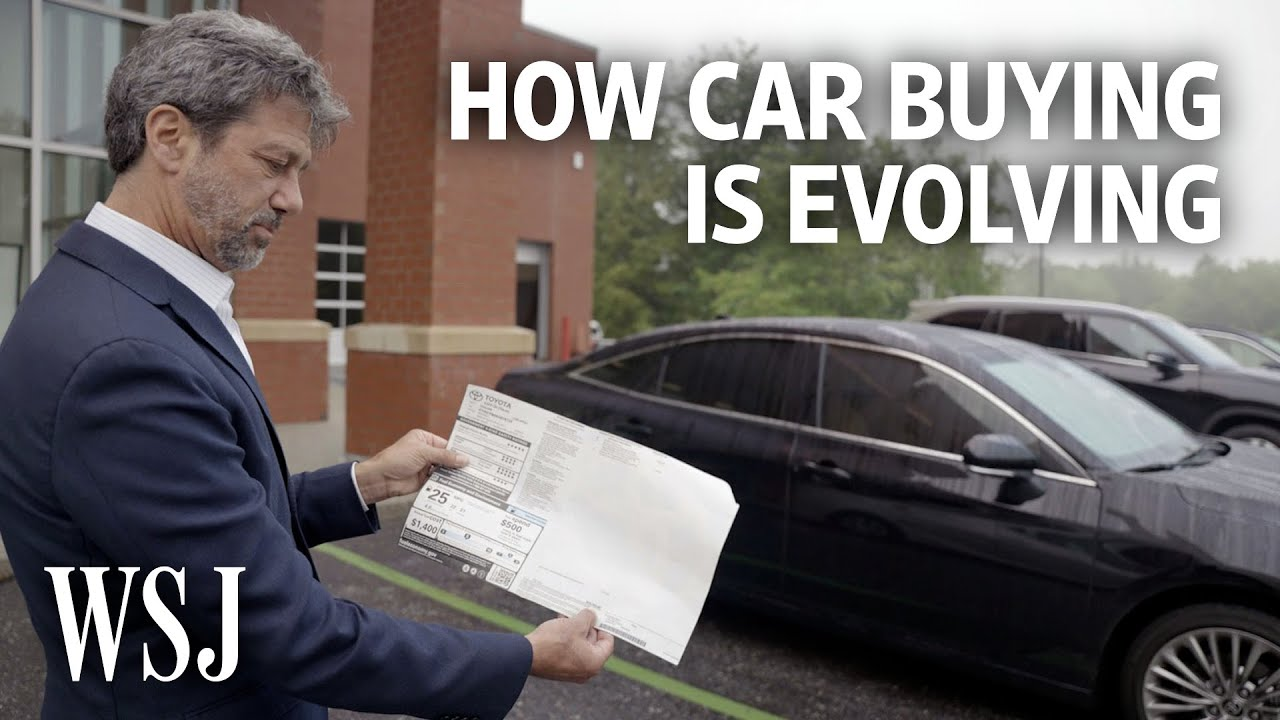The video explores the changes in the car purchasing experience due to pandemic-related supply chain disruptions and a shift toward electric vehicles. It examines how the limited availability of new cars, alongside rising demand, has altered traditional buying behaviors, prompting customers and automakers alike to rethink their approaches.
The effects of low vehicle inventory have led to reduced price negotiations and increased online pre-purchase activities, ultimately benefiting dealers financially despite a decrease in sales volume. Discussions also focus on how electric vehicle manufacturers like Lucid Motors are adopting direct-to-consumer sales strategies, challenging traditional dealership models with set pricing and online purchasing.
Main takeaways from the video:
Please remember to turn on the CC button to view the subtitles.
Key Vocabularies and Common Phrases:
1. disruption [dɪsˈrʌpʃən] - (noun) - A disturbance or problems that interrupt an event, activity, or process. - Synonyms: (disturbance, interruption, commotion)
The disruption, coupled with the shift toward electric vehicles, is now causing consumers and automakers to rethink how Americans buy cars.
2. inventory [ˈɪnvəntɔːri] - (noun) - A complete list of items such as property, goods in stock, or the contents of a building. - Synonyms: (stock, supply, list)
Pandemic related supply chain issues have pushed new vehicle inventory to historic lows, prompting higher prices and months long waits for new cars
3. incentives [ɪnˈsɛntɪvz] - (noun) - Things that motivate or encourage someone to do something. - Synonyms: (motivation, inducement, encouragement)
Right now, dealers don't have to offer them when they're going to have to offer incentives
4. speculation [ˌspɛkjʊˈleɪʃən] - (noun) - The forming of a theory or conjecture without firm evidence. - Synonyms: (conjecture, guesswork, hypothesis)
Still, it's not an empty lot or even a full one that worries Lee. Instead, he's concerned about rising interest rates and a possible recession.
5. lean [liːn] - (adjective) - Efficient and with no waste; in this context, having fewer vehicles in inventory. - Synonyms: (efficient, streamlined, reduced)
Analysts say leaner inventory has actually benefited many dealers as the expense to carry a vehicle on the lot is greatly reduced.
6. macro [ˈmækrəʊ] - (adjective) - Large-scale; relating to the whole system rather than specific parts. - Synonyms: (global, large-scale, comprehensive)
And they've been accelerated by a number of things, by Tesla, by challengers, and certainly by macro and external events.
7. emphasized [ˈɛmfəsaɪzd] - (verb) - Give special importance or prominence to something in speaking or writing. - Synonyms: (highlight, stress, point out)
He emphasized that dealers are key to Ford's success.
8. rethink [ˌriːˈθɪŋk] - (verb) - To think about something again particularly in order to make changes to it. - Synonyms: (reconsider, reevaluate, reassess)
The disruption, coupled with the shift toward electric vehicles, is now causing consumers and automakers to rethink how Americans buy cars.
9. prospective [prəˈspɛktɪv] - (adjective) - Expected or expecting to be something particular in the future. - Synonyms: (potential, likely, forthcoming)
The less time you keep a vehicle on your dealership lot and the faster that you can sell it, it is going to be a more profitable sale.
10. adapted [əˈdæptɪd] - (verb) - To change your behavior so that it is easier to live in a particular place or situation. - Synonyms: (adjusted, modified, changed)
But everyone seems to have adapted pretty well.
Low Inventory and EV Sales Fuel Changes in How Americans Buy Cars - WSJ
This is Adam Lee. He's the chairman of Lee Auto Malls, which owns 16 dealerships in Maine. He's looking for a new car on their Toyota lot. This is an experience recent car shoppers are likely familiar with. Pandemic related supply chain issues have pushed new vehicle inventory to historic lows, prompting higher prices and months long waits for new cars. People want to buy more cars than we have, than we can possibly produce. This is not something that's happened in the industry in decades.
The disruption, coupled with the shift toward electric vehicles, is now causing consumers and automakers to rethink how Americans buy cars. So let's take a walk around a dealership and through an EV showroom to see how the car purchasing process has changed and what it might look like in the future. Buying a car has typically started here at the dealership, but these days, there's not much to see. If you had come here a couple years ago, you just would have seen row after row, probably ten to 15 rows of new inventory and some used. But now what you got is a whole bunch of empty lots. Nationally, there were about 1.1 million new vehicles available at the end of May. That's less than a third of what it was pre pandemic. And inventory at Lee's dealerships is the lowest it's ever been.
I found one. I found the one car. We have the one new car. So rather than searching the lot, many shoppers now search the Internet. We are seeing an increasing level of pre car buying activities happening online, whether that's researching what kind of vehicle you need, whether that's reaching out to the dealership, and increasingly being able to see what inventory the dealership has. At Lee's dealerships, sales representatives field these online inquiries, helping shoppers find cars and warning them about which vehicles may not be in stock for weeks, even months to come. In some cases, we have a one year waiting list. And so we sort of try to encourage them if they're looking at a vehicle that's going to take a year to arrive, to look at alternatives. And, you know, a lot of times, people, they know what they want. They'll wait.
Waiting means getting in line, and getting in line means putting down a refundable deposit. At Lee's Toyota dealership, around 300 deposits are still awaiting cars. On the one hand, it's nice to have 300 sold orders in the bank, and when the cars come in, they go out. On the other hand, in the old days, those cars would have already been sitting on the lot and we would have delivered them already. But everyone seems to have adapted pretty well. Analysts say leaner inventory has actually benefited many dealers as the expense to carry a vehicle on the lot is greatly reduced.
The less time you keep a vehicle on your dealership lot and the faster that you can sell it, it is going to be a more profitable sale. Overall sales volume at Lee's dealerships are down roughly ten to 15% from pre pandemic levels. But he says the business, like many other dealerships, is still quite profitable. A big reason the cost of cars. I happen to have the MSRP sticker to the one new car we have in the lot. That price Lee is showing is the manufacturer's suggested retail price, or MSRP. Suggested is the key word here because dealers are the ones who ultimately price the vehicle. So this car is $45,109.
Typically, buyers would negotiate that price they see in the window down even further. But now I don't think there's an awful lot of negotiating going on on the price of the new car, at least not at our stores. With few cars and high demand, shoppers don't have much power to negotiate. But dealers and analysts say negotiations were trending out even before the pandemic. Price negotiation is a scenario that consumers love to hate, hate to love. You know, they want to be able to feel like they've gotten a bit of a deal on something, but they don't like the process of it. Even without negotiation, though, shoppers could typically expect to pay less, thanks to deals and rebates that push prices below MSRP.
But incentive levels on new vehicles hit historic lows in May, averaging 2.5% of the average transaction price. Right now, dealers don't have to offer them when they're going to have to offer incentives. And when this negotiation sort of starts to resume will depend on inventory coming back. And that could take more than a year, analysts say, meaning prices are likely to remain high. So far this year, average prices have been over MSRP each month. In May, buyers paid an average of about dollar 900 over sticker for in demand models. Markups can be in the thousands.
We have always chosen not to mark up a hot vehicle, just that we feel the sticker prices. It's reasonable. Three years ago, we would have been thrilled if you said you're going to sell every car at MSRP. We would have said, that's great. Manufacturers have warned dealers against markups, saying they hurt the brand's image with consumers. But again, dealers set the price, at least for legacy automakers. Startup electric vehicle companies like Lucid Motors take a different approach, selling their cars primarily online, directly to consumers.
Oftentimes they know what they want. And in that case, having a digital experience that is directly connected to the company that's producing the vehicles just simplifies it. There is an offline component here. Lucid like Tesla and Rivian, have showrooms where customers can browse, sit in and customize a car in VR before they decide to buy. But when they do, the price is the price. No negotiation, no incentives. I think it allows both sides, both lucid and the customer, to really focus on learning and experience rather than, you know, this confrontational negotiation that typically takes place.
But selling from a studio like this isn't legal everywhere. State franchise laws require vehicles in most places to be priced and sold by a dealer. Ideally, there wouldn't be any laws that say that the manufacturer of products can't sell them directly to their customer. So, yeah, we're actively working to find ways to overturn those rules. While it's only EV makers using the direct sales model now, legacy automakers are eyeing a similar approach as they shift electric. Ford, in particular, plans to release new rules for how it sells its EV's in September.
CEO Jim Farley spoke last month about keeping zero inventory at dealers and sales being 100% online. I think our dealers can do it, but the standards are going to be brutal. They're going to be very different than today. Some dealers are concerned this may be an attempt to cut them out. Farley recently met with around 300 dealers to discuss concerns about EV sales. He emphasized that dealers are key to Ford's success. Lee, who doesn't sell Fords, sees a hybrid model. Maybe you order it online from the manufacturer, but I believe it's going to. For most, it will go to the dealership and they'll deliver the car to you.
This possible shift in approach toward EV sales comes as manufacturers and dealers alike are learning from the changes over the last two years. There were seeds for potential for changes in a process that wasn't always comfortable for consumers. And those seeds were there and they were being explored. And they've been accelerated by a number of things, by Tesla, by challengers, and certainly by macro and external events. Question is, what's here to stay?
Analysts and dealers expect more online activities and less negotiation in the future, but say incentives will return as inventory does, even if it doesn't go back to where it was. I think lower inventory levels may stick. I hope they do. It would be better if we had 100 new cars sitting here, not 300. We just. We don't need that many. Still, it's not an empty lot or even a full one that worries Lee. Instead, he's concerned about rising interest rates and a possible recession. I think some of these changes might help dealers weather the next recession. But in the end, if people aren't buying cars, you're not making money.
Innovation, Economics, Technology, Car Dealerships, Supply Chain, Automobile Industry, The Wall Street Journal


